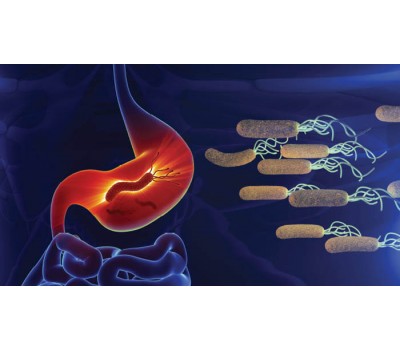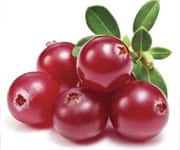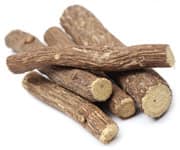Natural Support For Stomach Health

The discovery that H. pylori infection leads to serious stomach problems enabled two scientists to win the Nobel prize for their breakthrough research.1-3
Perhaps even more meaningful, it was found that eradication of H. pylori can relieve symptoms of stomach distress, including gastritis, and prevent cancer.4
The ulcer-inducing bacteria H. pylori is now believed to affect up to 40% of Americans.5
The good news is that Japanese researchers developed a unique nutrient combination ofzinc and carnosine to effectively counter the destructive impact of H. pylori.
Sold as a prescription drug in Japan, this combination is available in the United States as a supplement. Scientists have now gone a step further and enhanced the Japanese formula by adding natural cranberry, licorice extract, and picrorhiza to provide synergistic support for stomach health, without the adverse side effects associated with over-the-counter and prescription stomach aids.
In this article, you will learn how this combination of novel agents protects stomach tissue from acids, the damaging effect of anti-inflammatory drugs, and helps inhibit inflammation and H. pylori.
Protecting Stomach Tissue From Excess Acid Production
Certain individuals have sensitivities that require them to take extraordinary measures to protect their stomach. This includes those who take drugs that damage the gastric lining, and/or suffer chronic gastric infection/inflammation that may lead to cancer.
The extreme acidity of the stomach provides a primary defense against infection and assists in the early stages of digestion. However, keeping these high levels of acidity in check represents a serious biological challenge—and the fact that the body meets this challenge could be described as miraculous.
First, the specialized surface mucous cells in the stomach’s lining secrete a heavy coating of protective mucus. Second, a rapid turnover of cells in the lining itself keeps fresh cell troops always at the ready.
It’s a great system for protecting delicate stomach tissue from the powerful acids it secretes and contains. This organized system, however, requires precise balance.
Any breach in these defenses rapidly grows into a major problem.
Virtually everyone has experienced at least mild gastritis, or the upset stomach that we commonly associate with overindulgence and stress. While these are usually thought of as annoyances, each episode causes a bit more lasting damage—eventually resulting in cellular injury, which in turn causes inflammation.6
This inflammation then produces free radicals that go on to create still more tissue destruction,7,8 eventually damaging DNA and potentially leading to cancers of the stomach, which are among the most lethal malignancies.9-11
Infection with the H. pylori bacterium produces all these effects and more. In fact, H. pyloriis now recognized as a major cause of stomach and upper intestinal disorders, including ulcers of the stomach and duodenum (the beginning of the small intestine), gastric cancer, and gastritis.12,13
Once H. pylori takes hold in the stomach lining, it relies on its elaborate defense mechanisms that allow it to survive the potent acids.14
The bacteria produces an influx of inflammatory cells by secreting powerful “virulence factors.”12 In a microscopic one-two punch,15 these bacterial proteins block normal function of free-radical scavengers, while boosting free-radical production from immune cells.16,17 H. pylori extends its damaging effects by stimulating yet another group of immune cells to produce inflammatory cytokines—the messengers that call new inflammatory cells into the region.12
Antibiotic treatment can be effective against H. pylori. But there is powerful evidence for the role of two nutrients in alleviating the misery caused by this bacterium.18,19

WHAT YOU NEED TO KNOW
Natural Stomach Protection
- The short-term consequence of a lifestyle of alcohol, medications, fast food, and chronic stress is often gastric distress—but the long-term consequence is serious damage to delicate stomach tissue.
- Further magnifying these threats is the unrelenting spread of the ulcer-inducing agent H. pylori, now believed to affect up to 40 percent of Americans.
- Zinc-carnosine, cranberry, licorice extract, and picrorhiza—provide safe, effective, synergistic support for stomach health, without the high cost and adverse side effects associated with over-the-counter and prescription stomach aids.
- Together, these nutrients powerfully protect stomach tissue from acids—in turn helping to prevent cancer—and inhibit free-radical damage and inflammation, stimulate immunity, fight H. pylori infection, and speed healing.
Zinc-Carnosine

Zinc supplementation has been repeatedly shown to provide potent gastroprotective effects20,21 and to improve the response to therapy of certain cancers.22
Another nutrient called carnosine can boost these effects even further.
Japanese researchers have led the way in developing a unique zinc-carnosine compound, sold as a prescription anti-ulcer drug in Japan.23,24 This simple nutrient compound—comprising zinc and carnosine linked by a chemical bond—is available in the United States as a nonprescription dietary supplement that is safe for long-term use.22,23
Researchers found that this zinc-carnosine combination adheres to the stomach wall much more tightly than either zinc or carnosine alone—allowing beneficial effects of both components to be delivered directly to the site where protection is most needed.25
Some of the mechanisms behind zinc-carnosine’s protective effects against ulcers were found to be its free-radical-neutralizing effects26,27 and its capacity to boost production of a growth factor that may be important for gastric wound repair.28,29 Zinc-carnosine was also found to prevent the fragmentation of DNA in stomach-lining cells that can cause them to become cancerous.30 Animal and laboratory studies showed that zinc-carnosine stabilizes the membranes of inflammatory cells, preventing them from releasing cytokines and enzymes that can cause the stomach to begin digesting itself.31,32
Additionally, this nutrient combination was shown to inhibit stomach inflammation and cytokine release caused by H. pylori infection33 and to speed eradication of the infection itself34—providing a nutritional way to break the infection-inflammation-cancer chain.
Numerous studies showed that in animals given even single doses of zinc-carnosine, ulcers caused by stress, ischemia (poor blood flow), alcohol, and other toxins were either prevented or rapidly healed.35-40
A scientific team tested the effects of zinc-carnosine on rats with gastric cells damaged by stress or indomethacin, a potent NSAID (nonsteroidal anti-inflammatory drug). The nutrient combination reduced rat stomach injury by 75% and mice small-intestine injury by 50%. It also stimulated migration and proliferation of cells at and near the injury sites by almost 3-fold.41
A 2009 preclinical study found that a zinc-carnosine combination induces heme oxygenase-1 (HO-1)—an enzyme involved with protection against inflammation and oxidative stress42,43—in the stomach mucosa and safely provides mucosal protective effects.44
A 2013 preclinical study published in Life Sciences concluded that a zinc-carnosine combination protects against gastric mucosa damage—not only by reducing inflammatory cytokines and increasing expression of free-radical-quelling enzymes and growth factors—but also through the cytoprotective effects of increasing the level of heat shock proteins (HSP).45
In a clinical trial, 10 healthy volunteers took 50 mg of indomethacin three times daily with either a placebo or zinc-carnosine. Indomethacin increased gut permeability—impaired barrier function of the gut’s lining that allows inflammation to get its start—by a factor ofthree in the placebo group. But in the zinc-carnosine supplemented group, there was no significant increase in permeability. The researchers concluded that zinc-carnosine stabilized the cells of the mucosal lining of the stomach and small intestine, suggesting potent gastroprotective effects.41
Zinc-carnosine is one of the four important nutrients shown to protect gastric tissue from excess acid and the serious risks involved. Let’s now examine the other three.
Cranberries

Mounting evidence indicates that cranberries and their potent compounds inhibit H. pylori— a dangerous link in the infection-inflammation-cancer chain.46-48
In research reported in the journal Helicobacter, about two cups of cranberry juice or a placebo were given to 189 adults with H. pylori infection per day. After 35 and 90 days of treatment, more than 14% of the cranberry group—but just 5% of the placebo group—showed test results that suggested complete eradication of the H. pylori organism.49
A double-blind, randomized, clinical study was carried out in which 177 patients with H. pylori infection were asked to take 250 mL of either cranberry juice or placebo drink twice daily for three weeks. During the first week only, all participants also took a triple-therapy drug treatment for this infection consisting of two antibiotics (amoxicillin and clarithromycin) and one proton-pump inhibitor (omeprazole). H. pylori was eradicated in more than 95% of the female subjects who took the cranberry juice, compared with only 80 to 86% of the non-supplemented patients. The H. pylori eradication rates were also lower in male subjects supplemented with the juice, but sampling was not large enough for statistical significance.50
A systematic review concluded that regular intake of cranberry juice and other dietary products “might constitute a low-cost, large-scale alternative solution applicable for populations at risk for H. pylori colonization.”51
A later review found that the array of potent compounds in cranberries—anthocyanins, flavonols, flavan-3-ols, proanthocyanidins, and phenolic acid derivatives— “appears to be responsible for the cranberry property of preventing many diseases and infections, including cardiovascular diseases, various cancers, and infections involving the urinary tract, dental health, and Helicobacter pylori-induced stomach ulcers and cancers.”52
Licorice
Licorice extracts provide anti-inflammatory activities, reduce cytokine production, and boost production of stomach mucus.53-55
These extracts were shown to be as effective as the NSAID diclofenac (Voltaren®) in reducing inflammation,56 and human and animal studies demonstrated that deglycyrrhizinated licorice can reduce aspirin-induced damage to the stomach lining57 and promote healing of duodenal ulcers.58
Researchers enrolled 100 patients with endoscopically confirmed gastric ulcers and gave them either a leading antacid medication or a deglycyrrhizinated licorice extract medication called Caved-(S). At 12 weeks, 91% of patients were healed, as proven by endoscopic examination, with no significant difference between the drug and the licorice compound59—and there were still no differences even when long-term effects were examined in a follow-up study several years later.60
Without eradication of H. pylori infection, peptic ulcer disease has a 50 to 80% recurrence rate within six to 12 months after initial healing. A double-blind trial on 60 patients with peptic ulcer disease demonstrated that licorice is as effective as bismuth at eradicating H. pylori—prompting researchers to suggest licorice as a safe alternative for patients for whom bismuth may be contraindicated.61
Picrorhiza

Extracts of a perennial herb called picrorhiza (Picrorhiza kurroa), well-known in Ayurvedic medicine,62 have been found to have potent free-radical-quenching,62-66 immune-stimulating,67-70 and anti-inflammatory71-74 properties—activities central to gastric protection.
Scientists administered this extract to rats with ulcers induced by the potent NSAID indomethacin. Compared with the untreated group, picrorhiza-supplemented rats had much faster rates of ulcer healing, accompanied by a profound drop in levels of oxidized tissue components. And while free-radical-quenching enzyme activity decreased in the untreated animals, it was, in fact, boosted in treated rodents.75
In a study on mice with acute stomach ulceration induced by indomethacin, the healing capacity of picrorhiza was tested. After three days, biochemical analysis of stomach tissues showed that ulcer indices were reduced by 45% in the picrorhiza subjects, compared to the untreated mice.76
Together, zinc-carnosine, cranberry, deglycyrrhizinated licorice, and picrorhiza provide a multi-armed approach to gastric protection, improved stomach health, and cancer prevention.
Side Effects of Common Anti-Acid Drugs
Over-the-counter antacids can be very effective against acid damage. However, they do come with many potentially serious side effects—especially with prolonged use. As an alternative, zinc-carnosine, cranberry, licorice extract, and picrorhiza are natural agents that powerfully protect stomach tissue from acids without notable side effects, even with long-term use. Please note that individuals with esophageal reflux often need to reduce stomach acid and block stomach contents from reaching the delicate tissues of the esophagus. Some of these individuals will require at least temporary use of some of the following drugs:
| Class Of Acid-Blocker | Drug Name | Long-Term Effects |
| Aluminum-Containing Antacids |
Maalox®
Mylanta® |
Bone-softening77,78 |
| H2 Blockers |
Cimetidine
Ranitidine Famotidine |
Vitamin B12 deficiency79,80 |
| Proton-Pump Inhibitors |
Omeprazole
Esomeprazole |
Vitamin B12 deficiency80,81
Reduced medication bioavailability82 C. difficile -associated diarrhea82 Pneumonia81,82 Osteoporosis and vertebral and hip fracture81-83 Rebound acid over-secretion83 |
Summary
Prescription drugs, fast food, alcohol, and chronic stress can lead quickly to gastric distress—and in the long term, can seriously damage delicate stomach tissue.
Worsening this scenario, the unrelenting spread of the ulcer-inducing agent H. pylori is now believed to affect up to 40% of all Americans.
Fortunately, four natural nutrients provide safe, effective, synergistic support for stomach health, without the high cost and adverse side effects of over-the-counter and prescription stomach aids.
Zinc-carnosine, cranberry, licorice extract, and picrorhiza powerfully protect stomach tissue and protect it from acids, in turn helping to prevent cancer. They inhibit free-radical damage and inflammation, stimulate immunity, fight H. pylori infection, and hasten healing.
For convenience, consumers can now obtain the zinc-carnosine compound sold as a drug in Japan, along with standardized cranberry, picrohiza and licorice in one low cost supplement.
By Michael Downey
Article extracted from Life Extension Magazine October 2015


Social Login